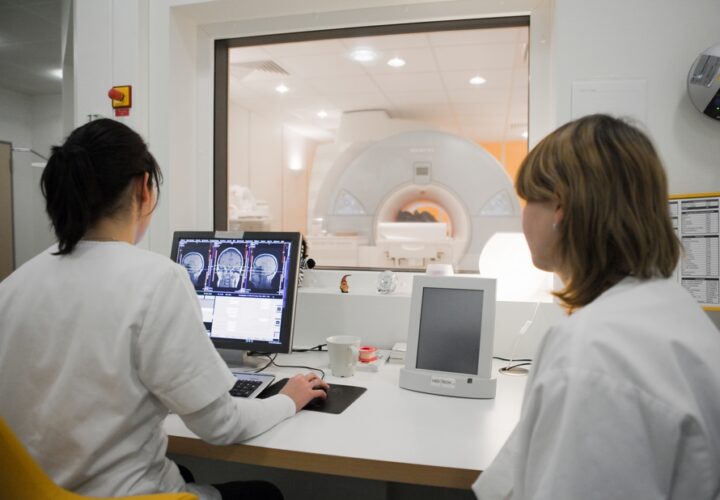Clinical trial participants, researchers and investors were reeling on Thursday after Biogen and Eisai, its Japanese pharmaceutical partner, announced that they would be halting two Stage 3 clinical trials that had previously reported positive results. Biogen said the drug, aducanumab, was unlikely to help patients.
“This disappointing news confirms the complexity of treating Alzheimer’s disease and the need to further advance knowledge in neuroscience. We are incredibly grateful to all the Alzheimer’s disease patients, their families and the investigators who participated in the trials and contributed greatly to this research,” said Michel Vounatsos, Chief Executive Officer at Biogen, in a statement.
In short, an independent monitoring committee found that participants who took aducanumab didn’t differ from those who took a placebo.
The drug was previously hailed as the hope on which an Alzheimer’s cure was pinned. In 2016, when aducanumab showed positive results in a small study, psychiatrist Eric Reiman, executive director of the Banner Alzheimer’s Institute in Phoenix, Arizona, said it was the most promising anti-amyloid drug he’d ever seen. “This drug had a more profound effect in reversing amyloid-plaque burden than we have seen to date,” he said to Nature.com. Another scientist who worked on the trial called it the “best news” about Alzheimer’s in his 25 years of working in the field.
But those hopes were dashed on Thursday.
Biogen was enrolling patients in the trial until very recently, according to Laura Mino, whose 72-year-old father was first diagnosed with frontotemporal dementia in 2015 and then Alzheimer’s in November of last year. Her father enrolled in the trial two months ago after months of filling out paperwork and waiting for test results. “We had some hope because the study was showing positive progress in patients,” said Mino. Now that the trial has abruptly ended, Mino and her family will speak to the doctor about potentially enrolling in another trial—but emotionally, the highs and lows have taken a toll.
This is the latest in a string of failures of drugs that target beta-amyloid, the toxic protein that accumulates in the brains of Alzheimer’s patients. Known as the ‘beta-amyloid hypothesis,’ the idea that this particular protein triggers the neuron death and memory-stealing symptoms that accompanies Alzheimer’s has long been the gold-standard against which scientists have pitted drugs. Aducanumab was supposed to remove this protein from the brains of patients. Biogen enrolled people in the early stages of Alzheimer’s in an effort to make a difference in beta-amyloid, which starts accumulating decades before symptoms appear, in a way that would improve the drug’s chances of success.
Biogen will continue with two other drugs in trials, BAN2401 and elenbecestat, which also target beta-amyloid.
The latest news, however, has some questioning if beta-amyloid is even the right target. Drug discovery chemist and blogger Derek Lowe has long been a critic of the amyloid theory. “Amyloid definitely has something to do with Alzheimer’s—there’s far too much evidence to dismiss,” he wrote in a recent blog post. “But the situation is clearly more complicated than people have hoped, because otherwise, all the attempts to address amyloid (via antibodies and otherwise) would have yielded some tiny bit of clinical benefit. They have not.”
But the evidence shows that beta-amyloid is a factor in Alzheimer’s.
“We know that amyloid is a key player for persons with early-onset [Alzheimer’s],” said Bill Burke, M.D., of the Banner Alzheimer’s Institute in a chat moderated by Being Patient. “All of the known genetic mutations that cause early-onset [Alzheimer’s] result in excess amyloid production. We still believe that starting earlier is going to be extremely important since we know that amyloid accumulates for 10 years before a person develops dementia.”
Still, Burke stressed that fresh ideas on a cure for Alzheimer’s are necessary.
“It is a sobering reminder to someone like me who has been doing this for 30 years just how much we rely on new ideas and new possibilities in this field. We are incredibly dedicated to continuing, despite any setbacks that we run into. We very much appreciate all of the people who participate in trials because we will never have a new treatment unless people are willing to work with us,” said Burke.
Those sentiments were echoed by advocacy groups around the world.
“Dementia is a vastly complex condition, which presents a huge challenge to researchers,” said Fiona Carragher of the Alzheimer’s Society. “The lessons learned from this amyloid targeting drug will inform future trials, taking us ever closer to a cure.”
[ Next: When Should We Start Taking Drugs to Prevent Alzheimer’s? ]




Researchers have been working for years to develop an effective treatment for Alzheimer’s disease; based on the idea that beta amyloid protein plaque alone triggers the neuron death and memory-stealing symptoms that accompanies Alzheimer’s. This idea has for a long time been the gold-standard against which scientists have pitted drugs. But one “miracle” drug after another has failed to live up to its promise.
The evidence shows that beta-amyloid is a factor in Alzheimer’s. But with Recent disappointments of large Phase 3 studies: bapineuzumab (Pfizer), solanezumab (Eli Lilly), crenezumab (Roche), gantenerumab (Roche), and of aducanumab (Biogen) which could have offered hope and a disease modifying therapy for Alzheimer’s disease, it’s becoming more and more apparent that amyloid plaques are necessary but not sufficient in causing Alzheimer’s Disease.
The termination of aducanumab phase 3 trials, along with the discontinuation of the crenezumab program by Roche Holdings and partner AC Immune announced on January 30, 2019 and previously of bapineuzumab (Pfizer), solanezumab (Eli Lilly), and gantenerumab (Roche) underscores the urgent need for drug candidates that can tackle the oxidative stress that lead to the deposition of soluble amyloid as beta amyloid plaques, as well as the inflammatory response to the beta amyloid plaques that lead to the generation of the toxic oligomers and neurofibrillary tangles, and subsequently the signs and symptoms of Alzheimer’s, disease. This can be disrupted by natural anti-inflammatory antioxidants capable of crossing the blood brain barrier.
What is commonly found at autopsy in the brain of all patients who suffered from Alzheimer’s disease are neurofibrillary tangles; which acting just like “adhesion bands” interrupts neurons and synapses and affects neural transmission in the brain, and at the same time also disrupts blood flow throughout the brain especially in the hippocampus.
There are many research publications that elucidates, and confirms the inflammatory response to the beta amyloid plaques and toxic oligomers, deposited as a result of oxidative stress as the likely culprit.
Oxidative Stress is a prime contributor to Cognitive Decline and Alzheimer’s Disease in Older People, in addition to the Chronic Inflammatory Response Triggered by the beta amyloid plaques so deposited in the human brain.
PATHOPHYSIOLOGY
First and Foremost there is precipitation of Soluble Amyloid Beta 40 / 42 as Beta Amyloid Plaques in the presence of Oxidative Stress.
Secondly, The Beta Amyloid Plaques so deposited triggers an inflammatory response; during which phase C-Reactive Protein, Tumor Necrosis factor, NFKappa Beta, and other mediators of inflammation rises in their levels.
Thirdly, The Inflammatory Response triggered by the beta amyloid plaques, so deposited in the brain, ultimately leads to the formation of hyperphosphorylated Tau proteins/neurofibrillary tangles that obstructs nutrient and oxygen supply to the brain and causing progressive ischemic atrophy of the brain.
Whilst walking and other forms of physical and intellectual exercise can improve the cognitive impairment associated with Alzheimer’s disease, the brains inflammatory response to the beta amyloid plaque deposits and oxidative stress; which results in neurofibrillary tangle formation, and subsequently the signs and symptoms of Alzheimer’s, can be disrupted by natural anti-inflammatory antioxidants capable of crossing the blood brain barrier.
Research evidence from a number of studies has shown the link between diet, exercise, and brain health. Among other things, it has been shown that when we exercise, the brain produces more of a special brain-growth repair hormone called brain-derived neurotropic factor (BDNF) that stimulates the increase in brain connections — dendrites and synapses — especially in the hippocampus.
To combat Alzheimer’s disease from developing later in life we all need mental and aerobic exercises, peppers, tomatoes, eggplants, withania somnifera extracts and other foods rich in the following nutrients:
L-CYSTEINE
VITAMIN D3
PHOSPATIDYL CHOLINE + VITAMINS B1, B5, B6 AND B12
ASTAXANTHIN
CURCUMIN(TUMERIC)
HIGH DOSE RESVERATROL
For almost 4 years, I have been a participant in Eli Lilly‘s study of Solanezumab, taking either the real drug or the placebo every four weeks. I have had no adverse reactions to what I was taking and am now about to begin actual treatment with guaranteed Solanezumab.
Roselyn,
How is going with the Solanezumab?